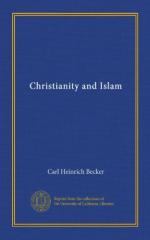The East, however, cannot break away from the theories of life and mind which grew in it and around it. Even at the present day the Oriental is swathed in mediaevalism. A journalist, for instance, however European his mode of life, will write leaders supported by arguments drawn from tradition and will reason after the manner of the old scholasticism. But a change may well take place. Islam may gradually acquire the spirit as well as the form of modern Europe. Centuries were needed before mediaeval Christianity learned the need for submission to the new spirit. Within Christendom itself, it was non-Christian ideas which created the new movement, but these were completely amalgamated with pre-existing Christianity. Thus, too, a Renaissance is possible in the East, not merely by the importation and imitation of European progress, but primarily by intellectual advancement at home even within the sphere of religion.
Our task is drawing to its close. We have passed in review the interaction of Christianity and Islam, so far as the two religions are concerned. It has also been necessary to refer to the history of the two civilisations, for the reason that the two religions penetrate national life, a feature characteristic both of their nature and of the course of development which they respectively followed. This method of inquiry has enabled us to gain an idea of the rise and progress of Muhammedanism as such.
An attempt to explain the points of contact and resemblance between the two religions naturally tends to obscure the differences between them. Had we devoted our attention to Islam alone, without special reference to Christianity, these differences, especially in the region of dogmatic theology, would have been more obvious. They are, however, generally well known. The points of connection are much more usually disregarded: yet they alone can explain the interchange of thought between the two mediaeval civilisations. The surprising fact is the amount of general similarity in religious theory between religions so fundamentally divergent upon points of dogma. Nor is the similarity confined to religious theory: when we realise that material civilisation, especially when European medievalism was at its height, was practically identical in the Christian West and the Muhammedan East, we are justified in any reference to the unity of Eastern and Western civilisation.
My statements may tend to represent Islam as a religion of no special originality; at the same time, Christianity was but one of other influences operative upon it; early Arabic, Zoroastrian, and Jewish beliefs in particular have left traces on its development. May not as much be said of Christianity? Inquirers have seriously attempted to distinguish Greek and Jewish influences as the component elements of Christianity: in any case, the extent of the elements original to the final orthodox system remains a matter of dispute. As we learn to appreciate historical connection and




